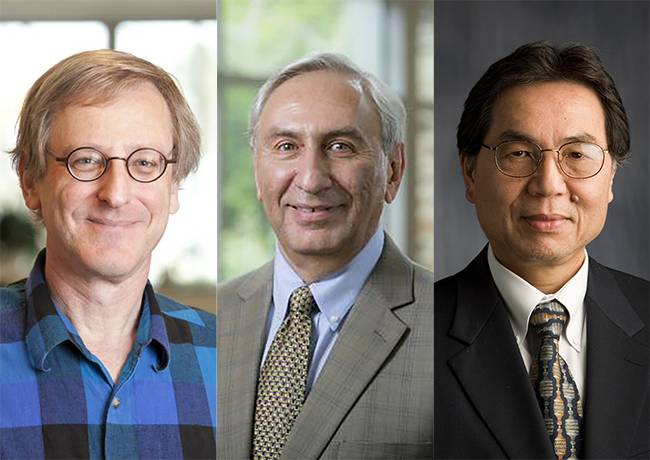Duke Scientists Receive Royal Society of Chemistry Awards

Three Duke scientists representing the Pratt School of Engineering and Trinity College of Arts & Sciences’ Department of Chemistry have been recognized by the Royal Society of Chemistry, the organization announced May 7.
The society grants awards and prizes annually in recognition of originality and impact in research, or for each winner’s contribution to the chemical sciences industry or education. They also acknowledge the importance of teamwork across the chemical sciences, as well as the abilities of individuals to develop successful collaborations.
Of those to have won a Royal Society of Chemistry Award, 50 have gone on to win Nobel Prizes for their pioneering work.
David Beratan, R.J. Reynolds Professor of Chemistry
Beratan has received the Bourke Award for developing tunneling pathway and flickering resonance theories of biological electron transfer. His research is focused on developing theories for how fast particles can move, and how their motion is assisted or hindered by the surrounding matter. These studies will allow Beratan’s team to learn the lessons of how biology manipulates energy at molecular scale, in turn enabling the design of the next generation of high efficiency structures for solar energy capture and utilization.
“We have developed a somewhat unconventional style of performing theoretical chemistry on large and complex macromolecular systems,” Beratan said. “We carry out most of our studies in intimate contact with experimental collaborators and aim to develop explicitly testable predictions by formulating hypotheses that guide experimental designs. This approach has proven to be immensely satisfying and fun, and we are thrilled when we can see our insights influence laboratory activities and discoveries in a positive way.”
Beratan is also an alumnus of Duke University.
Michael Rubinstein, professor of mechanical engineering and materials science, biomedical engineering, chemistry and physics
Rubinstein has won the Soft Matter & Biophysical Chemistry Award in recognition of his physiocochemical insights into soft matter behavior relevant to respiratory disfunction. His work found that the previously understood model on how the human respiratory system works was flawed – dispelling the notion that water played a pivotal part in expelling mucus from the body. Rather, his team found that the hair-like structures in the airways that help expel mucus had a brush-like layer of molecules attached to them. The research has offered a new understanding on how this system works, and is providing a new unifying theory on how to treat respiratory illnesses, such as cystic fibrosis.
Outside of this seminal research and other discoveries in the field, Rubinstein has also played an active role in the society’s administration. He chaired the editorial board of the journal Soft Matter for four years and led the transition from an in-house professional editorial board to one filled by scientists from around the world, which is the standard for its peer society-based journals.
Tuan Vo-Dinh, R. Eugene and Susie E. Goodson Professor of Biomedical Engineering, professor of chemistry and director of The Fitzpatrick Institute for Photonics
Vo-Dinh was awarded the Sir George Stokes Award for outstanding and sustained contributions to analytical science through innovations in photonics, spectroscopy, molecular biology and nanotechnology. His research has produced a host of innovative technologies that have profound impact in many fields for improving and protecting the environment and human health. Vo-Dinh was among the first to combine the recognition power of nature (e.g. antibodies) with light-based sensing technologies to develop powerful devices called biosensors.
“This award is very special to me as it underlines the importance of bringing together different disciplines to create innovative technologies in order to solve problems of global importance in analytical science,” said Vo-Dinh.